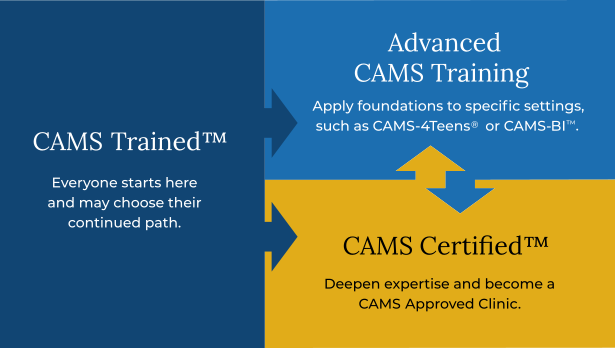Support your university counseling center staff with CAMS training to provide students with quality, evidence-based care that helps save lives.
Training is available for:
- Counselors
- Staff and supervisors
- Graduate students and peers under supervision
University Students Are Struggling
Suicide is the second leading cause of death among university students, and 1 in 4 students report struggling with suicidal ideation.1 University can be an extremely stressful time in one’s life. Many students face pressures from academics and planning for the future. Additionally, they experience various personal life changes in young adulthood. As a result, many students need support. A study from the University of Michigan found that the number of students who sought out counseling services increased from 30% to 37% between 2020 and 2022.2
While it’s encouraging to see more students recognizing their need for help, universities may struggle to keep up with the growing demand. Many university counseling centers limit the number of counseling sessions a student can attend each semester or school year. This restriction makes it challenging for counselors and students to feel that they are making progress. Therefore, university counselors need something that can make a lasting impact—even when time is short. This is where CAMS can be effective.
Case Study: Reducing College Student Hospitalizations
In 2016, the Counseling and Psychological Services (CAPS) at the Rollins College Wellness Center in Winter Park, Florida, made changes to their approach. They adapted the CAMS Framework® to help assess and treat students who were struggling with suicidal thoughts. Since then, it has helped students avoid hospitalization, providing a common language and thorough documentation to support treatment moving forward.
How CAMS Can Help
CAMS is an evidence-based, suicide-focused framework. It helps clinicians accurately assess suicide risk. Additionally, it provides a clear path for treatment. CAMS was initially developed for university students who were struggling with serious thoughts of suicide. It has been found to resolve suicidal ideation in as few as 6–8 sessions. This makes it an effective option for this audience.
Benefits of CAMS for University Counseling Centers
Effective Right Away
CAMS engages individuals immediately by helping them identify suicidal drivers and equipping them with a rapid treatment plan. This means that even with a limited number of sessions, it can leave a lasting impact.
Shared Language
When CAMS is being used in a system of care, it creates a shared language for each provider who works with the patient over the course of treatment. This helps ensure that the patient is getting the best care possible at each stage of their treatment journey.
A Clear Path Forward for Students
Recovery is always the end goal. Training university counseling center staff in suicide prevention with CAMS is essential. It helps university students receive a clear path for treatment. This supports their recovery from suicidal suffering.
Keeping Students in School
At a time when colleges are dealing with lower enrollments and retaining students, CAMS is delivered in an outpatient setting allowing the student to remain in classes.
How CAMS Training Works
CAMS-care offers clinical suicide treatment training that can easily be adapted for those who are working with university students. We recommend that providers first become CAMS Trained™. After receiving the CAMS Trained designation, you and your team can enroll in Advanced CAMS training programs that take your CAMS knowledge further. Designed to be adaptable and flexible, CAMS is able to be used in a wide variety of university settings across differing populations and cultural backgrounds.

As a clinician who has lost a loved one to suicide, I can vouch for CAMS being not only instructive but also personally healing in helping me feel like I CAN help people who think of suicide.
Evan Merida, MA, LPC, NCC
Sun and Shade Counseling, Denver, CO
The approach of sitting with a client’s thoughts of self harm without immediately jumping to hospitalization has led to better outcomes — both because I’m more confident to stay in that space with them and because that willingness creates a greater trust between us.
CAMS Trained Clinician
Frequently Asked Questions
Universities can prevent suicide by creating a culture of connection, providing training to staff and faculty, and ensuring quick access to effective counseling. The CAMS Framework® was originally developed in university counseling centers and remains one of the most effective approaches, helping students address the underlying drivers of suicidal thoughts in as few as 6–8 sessions.
Best practices include campus-wide mental health education, coordinated response protocols, and rapid referral to trained counseling staff. Many universities use a stepped care model, where faculty, peers, and health services work together to identify risk early and connect students to care. See how CAMS fits into university settings.
When a student is suicidal, colleges should respond with empathy, immediate risk assessment, and a collaborative safety plan. Counseling staff trained in evidence-based approaches like CAMS engage the student directly, validate their experience, and co-create a path toward stability and hope. Read more about the CAMS Framework®.
CAMS training equips counselors with a structured, evidence-based framework to engage suicidal students in treatment. It provides a shared clinical language, clear treatment pathways, and practical tools for assessment and documentation—supporting consistency across counseling staff.
CAMS is effective for university students because it addresses their unique stressors and empowers them as active participants in their own care. Research shows CAMS not only reduces suicidal ideation but also helps students stay in school by creating realistic, collaborative safety plans. See the evidence supporting CAMS.
CAMS gives university clinicians confidence and clarity when working with suicidal students. Counselors report improved assessments, stronger engagement, and more consistent outcomes across their teams. The structured approach also streamlines documentation and supports supervision.